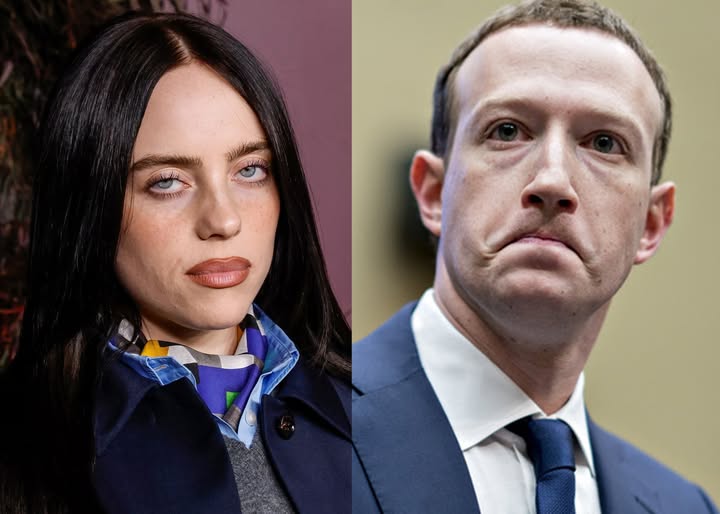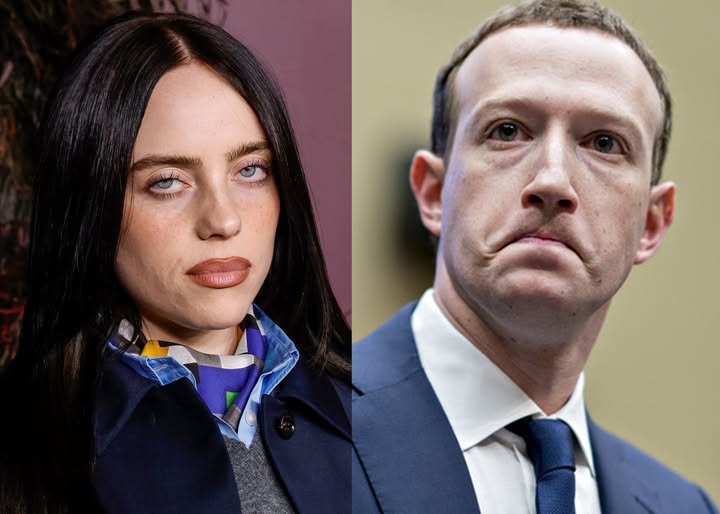When Billie Eilish took the stage at the WSJ Magazine Innovator Awards in Manhattan, no one could have predicted that a 23-year-old pop star would ignite one of the most powerful conversations about wealth, morality, and humanity in recent years. The event was everything you would expect from a gathering of the world’s most powerful people — a dazzling ballroom filled with designer tuxedos, champagne, and the gentle hum of self-congratulation. Billionaires mingled with celebrities, cameras flashed, and applause echoed through the air. But the tone shifted the moment Billie Eilish took the microphone.
Her eyes scanned the room — a sea of billionaires, CEOs, and icons of modern capitalism. What she said next was not rehearsed flattery or a polished acceptance speech meant to keep the powerful comfortable. Instead, she spoke truth. Pure, unfiltered, and unsettling truth.

“If you have money,” Billie said, her voice steady, “it would be great to use it for good things. Maybe give it to some people that need it. If you’re a billionaire, why are you a billionaire? Give your money away, shorties.”
For a split second, the room fell silent. The words hung heavy in the air like a thunderclap. The polite smiles froze, and the applause that usually follows every celebrity speech didn’t come immediately. The audience didn’t know how to react. Among those seated near the front was Mark Zuckerberg, one of the richest men in the world. Witnesses later said he didn’t clap. He simply sat there, stone-faced, lips pressed together, eyes forward — the embodiment of discomfort.
In that moment, Billie Eilish did what few have dared to do: she confronted the culture of wealth worship directly in front of those who perpetuate it. And she did it with the grace and power that only authenticity can carry.
What made her words so powerful wasn’t just the bravery of calling out billionaires in their own house — it was the sincerity behind them. Because Billie didn’t just talk about generosity or empathy; she lives it. Later that evening, it was revealed that she had donated $11.5 million from her “Hit Me Hard And Soft” world tour to causes focused on food equity, climate justice, and community rebuilding projects. While many billionaires donate as a form of image control or tax benefit, Billie gave from conviction. Her actions weren’t a headline stunt — they were a statement of belief that money should serve humanity, not rule it.
The crowd’s reaction spoke volumes. Some clapped hesitantly, others exchanged awkward glances. But for millions watching online, the message landed with the force of a cultural reckoning. Because what Billie Eilish said wasn’t just about the ultra-rich in the room; it was about a system that has normalized greed and inequality for decades.
In a world where ordinary families are drowning in debt while billionaires race each other to space, Eilish’s words pierced through the glittering illusion of success. Her question — “Why are you a billionaire?” — was not rhetorical. It was a moral indictment.
To understand the gravity of her statement, we have to recognize the context. The gap between the rich and poor has never been wider. The pandemic revealed just how fragile most people’s lives are, while the wealthy grew richer than ever. Corporations posted record profits while workers struggled to afford basic necessities. The cost of living has skyrocketed, yet wages remain stagnant. Homelessness, hunger, and medical debt are everyday realities for millions. And still, billionaires accumulate more.
Billie’s speech didn’t just expose greed; it exposed the hypocrisy behind performative philanthropy — the kind where billionaires throw charity galas for publicity while quietly avoiding taxes and exploiting workers. It highlighted the moral vacuum at the heart of unchecked capitalism. When she said, “Give your money away, shorties,” she wasn’t being disrespectful — she was being revolutionary.

Her words were a challenge: if your wealth depends on the suffering or exploitation of others, is it really something to be proud of?
Billie Eilish’s courage didn’t come out of nowhere. She’s long been an advocate for environmental protection, mental health awareness, and equality. Unlike many of her peers who stay silent to preserve brand deals or industry connections, Billie has always spoken from her heart. She doesn’t chase popularity — she uses it as a tool for impact. That night, her words became a spark in a global conversation about what success should truly mean.
Mark Zuckerberg’s silence, meanwhile, became symbolic. It wasn’t just the reaction of a man caught off guard — it represented the entire billionaire class’s discomfort with accountability. These are people who live in echo chambers of admiration, where every move they make is praised. To be publicly challenged by someone younger, braver, and unbought shook the room.
But here’s the thing about truth: it doesn’t need applause to matter. It only needs to be spoken.
Eilish’s message resonated across the world because it came from a place of empathy, not envy. She wasn’t attacking individuals; she was calling out a mindset — the idea that endless accumulation is not only acceptable but admirable. She reminded people that hoarding obscene wealth while others suffer is not a sign of brilliance; it’s a failure of compassion.
As her speech went viral, social media exploded with reactions. Millions shared clips of her moment, praising her bravery. Some called her “the voice of her generation.” Others pointed out the irony — that it took a pop star to say what political leaders refuse to. Hashtags like #TaxTheRich and #BillieEilishTruth trended worldwide. People began re-examining their own definitions of success, questioning the moral cost of idolizing billionaires.
And yet, her critics were quick to appear. Some dismissed her as “naive,” arguing that billionaires drive innovation and create jobs. But that argument ignores the reality that much of that innovation thrives on inequality — on cheap labor, tax loopholes, and political lobbying. The myth of the benevolent billionaire is just that: a myth. Billie Eilish’s point wasn’t that success is evil; it’s that success without humanity is meaningless.

She reminded the world that you can’t take your billions to the grave, but you can leave behind a legacy of kindness and change. Her message wasn’t anti-wealth. It was pro-humanity.
It’s rare to see someone in entertainment use their platform with such conviction. Too often, celebrity activism feels hollow — a photoshoot with charity logos, a speech written by PR teams. Billie’s moment was different because it wasn’t filtered. It was emotional, raw, and real. She didn’t speak to gain approval. She spoke because silence wasn’t an option.
And that’s what makes her stand out.
There’s a generational shift happening, and Billie Eilish represents it. Her generation is tired of excuses. They’re tired of watching the world burn while billionaires talk about colonizing Mars. They’re tired of being told that “hard work” will get them ahead when the game is rigged. Her words struck a chord because they came from lived reality — from the frustration of a generation that inherited problems they didn’t create.
By calling out the powerful, Billie Eilish reminded everyone that courage doesn’t come from status — it comes from integrity. Her $11.5 million donation wasn’t just generous; it was symbolic of what wealth can do when it’s guided by empathy. She didn’t wait for a foundation or a corporate sponsor. She simply gave.
The contrast between Billie’s generosity and Zuckerberg’s silence paints a vivid picture of the divide in modern society. On one side, empathy; on the other, ego. On one side, action; on the other, apathy.
What’s truly remarkable is how Billie’s act of defiance will ripple through time. Every generation has its truth-tellers — people who speak when others are afraid to. For the 2020s, Billie Eilish has proven to be one of them. Her courage reminds us that cultural power can sometimes be more transformative than political power.
Because when someone speaks truth to wealth, it resonates far beyond a single event. It inspires conversations in homes, classrooms, and workplaces. It forces people to question what they value — and who benefits from their silence.

In the end, her question — “Why are you a billionaire?” — is not an accusation but an invitation. An invitation for reflection, for redistribution, for compassion. For the ultra-rich, it’s a call to responsibility. For everyone else, it’s a reminder that we don’t need billions to make a difference — we just need to care.
There’s something poetic about how Billie’s message unfolded. A young woman, barely halfway through her twenties, standing in front of the world’s most powerful men and women, speaking truth without fear. It felt like a passing of the torch — from a generation that measures worth by wealth to one that measures it by impact.
The irony is that many of those billionaires will likely forget her words by the next morning, returning to their boardrooms and investments. But for the rest of us, her speech lingers. It challenges us to think differently about how we define success. It reminds us that kindness and empathy are not just moral choices — they are revolutionary acts in a system that rewards selfishness.
Billie Eilish’s moment at the WSJ Innovator Awards wasn’t a scandal. It was a mirror. And what it reflected was uncomfortable but necessary.
In a time when inequality is widening and compassion feels like a luxury, her voice was a spark of sanity. She didn’t need to shout. She didn’t need to insult. She simply asked a question that cuts to the core of what’s wrong with modern society.
Why are you a billionaire?
Why do you need that much when so many have so little?
And what does it say about us that we cheer for excess while ignoring suffering?
Her message was simple yet profound: wealth without purpose is empty. Power without compassion is poison. And silence in the face of suffering is complicity.
This is why Billie’s speech will be remembered — not as a viral moment, but as a cultural reckoning.
She reminded us that leadership isn’t about commanding a room; it’s about standing for something even when the room goes quiet.

Billie Eilish didn’t just challenge the billionaires that night — she challenged all of us to do better, to give more, to live with empathy.
In a world that rewards greed, she chose generosity. In a culture obsessed with status, she chose sincerity. In a room full of money, she chose meaning.
Her courage is a reminder that sometimes the most powerful voice is not the loudest one — it’s the one that dares to speak when everyone else stays silent.
And maybe, just maybe, that’s where true innovation begins — not in wealth, but in the willingness to care.


